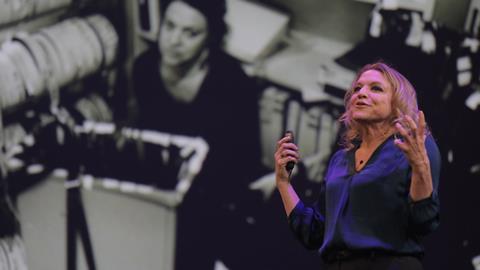Feminist force of nature Nina Menkes takes on the male gaze

Dir. Nina Menkes. US. 2022. 107 minutes
Brainwashed is a documentary for any woman in film who ever wanted, just even for a moment, to throw a grenade at the canon: Nina Menkes has the ammunition. What’s more important, however, is that this documentary, derived from a lecture on the mechanics of the male gaze given by the forthright academic and film-maker Menkes, goes further — into classrooms, on to Tik-Tok, into the consciousness of a new generation. It’s a crisp, take-no-prisoners antidote to the more feathery musings of the ubiquitous Mark Cousins, who recently produced a lengthy film about the films women have made. Menkes’ film has the answer to why they haven’t made more. And she also posits some of the reasons why women still are fighting the same old battles as she picks apart why they are still seen in the same old way.
Audiences will hopefully never look at perspective, slow-mo, fragmented bodies or female faces presented in 2D in the same way again
Best compared, stylistically, with last year’s Who We Are: A Chronicle Of Race In America by Jeffery Robinson, Brainwashed, which premieres in Sundance and is already booked for Berlin’s Panorama, should certainly travel a busy festival route - and Menkes has been to many of these places before with her source lecture. Like Robinson, it also takes a direct approach to a problem which is personal for the film-maker and universal for the audience. She’s a saltier soul, though, than the gently-insistent Robinson: an experienced and respected independent film-maker and artist who has provocateur etched on her soul.
Menkes wants her audience to learn, but she likes to swing her rifle around too - in 175 separate clips. Look out Vincent Gallo! Martin Scorsese! Paul Thomas Anderson! And, gratifyingly, that gyrating crotch shot in Titane and the whole of Hustlers, because, as Menkes explains, female directors aren’t exempt from viewing the world through a man-made lens either, even when they are being ‘ironic’ about it. Camera footage captures Menkes striding around the Croisette at Cannes 2018 - is she going to rugby-tackle that gallic boys’ club down the steps of the red carpet? You get the sense that if anyone could, it would be her.
Brainwashed doesn’t deliver the opposing views you might like to see aired in a film like this - it’s not a debate for her, even though some film professionals still think it is - and Menkes shows possibly too many clips from her own films (as illustrations of the right sort of take), particularly as this lucid documentary draws to a close. Yet still it’s vigorous, often brash, and full of information. Audiences will hopefully never look at perspective, slow-mo, fragmented bodies or female faces presented in 2D in the same way again, thanks to Menkes’ two-decades-plus of research. She certainly proves that shot design is gendered. As her eloquent interviewee Amy Zierling notes: “It’s invisible, and you don’t notice the air.”
Menkes moves beyond the predatory camera and the subject-object set-up, though. With her commentators — who also include Eliza Hittman, Julie Dash, Laura Mulvey, the intimacy co-ordinator Ita O’Brien and Joey Soloway, amongst others, she talks about the implied violence hidden in these tropes. The up-the-bum shot, the slow-pan down the body, the whole idea of a beautiful unconscious woman — taken to an extreme, recalls Rosanna Arquette, when her dead character was embraced by the camera in a sexual manner in Scorsese’s After Hours. Dead women, silent women - as with Cathy Moriarty’s character in Raging Bull, who literally couldn’t be heard - women seen bent over from behind - these turn into women whose consent is immaterial. The ‘Baby It’s Cold Outside’ trope where Harrison Ford, for example, smacks a resisting Sean Young in Bladerunner and she’s suddenly aroused, as with Jessica Lange in The Postman Always Rings Twice (1981). It’s disempowerment at its essence and, as Menkes said, it worms its way into the collective consciousness through the global power of Hollywood. (Or, in other words, forms the “bedrock of the language of rape culture”.)
Then there are the ‘magical people’ of the entertainment business - who aren’t viewed as working in reality so can’t resist when they’re asked for outrageous hours, fired for no reason (or in the case of female directors, not hired at all), or told to take their clothes off without any control over simulating sexual acts which invade their bodies and privacy.
Visually, even though DoP Shana Hagan has done a very warm job of making Menkes’ lectures appealing; this is pro forma stuff, content over execution, amid a lovely edit from Cecily Rhett. Music by Sharon Farber adds weight to the idea that this is all some sort of horror. And, yes, it’s very - but not totally - US-centric. (Godard gets a swipe, Kechiche a well-deserved name-check, and it’s hardly shocking to see some Korean directors referenced.) In a world of cinema which is very publicly polite, very reverent of the (typically male-dominated and -selected) ‘Canon’ and very conscious of the fact that it’s a (male-skewed) relationship business, Menkes is a real no-bullshit breath of fresh air. With a torch. And with any luck, she’s heading your way to set fire to something, soon.
Production companies: Menkes Films
International sales: UTA, McGrathJ@unitedtalent.com
Producers: Nina Menkes
Screenplay: Nina Menkes
Cinematography: Shana Hagan
Editing: Cecily Rhett
Music: Sharon Farber
























